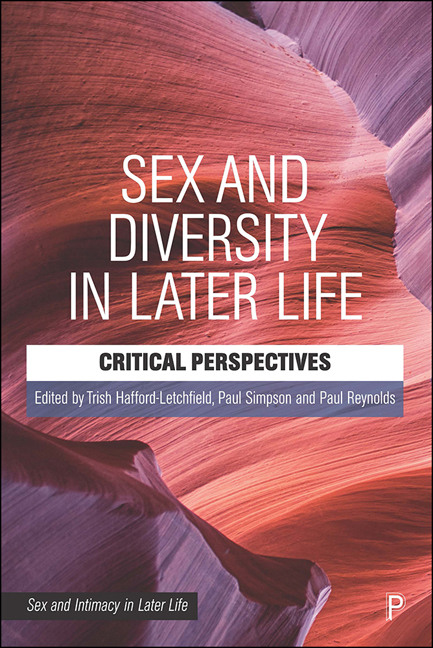Book contents
- Frontmatter
- Dedication
- Contents
- List of figures and tables
- Notes on editors and contributors
- Series editors’ introduction
- Foreword
- 1 Sex and intimacy in later life: a survey of the terrain
- 2 Sexual expression and pleasure among black minority ethnic older women
- 3 Sexual desires and intimacy needs in older persons and towards the end of life
- 4 Heterosexual sex, love and intimacy in later life: what have older women got to say?
- 5 Sex and ageing in older heterosexual men
- 6 Sex and older gay men
- 7 Thinking the unthinkable: older lesbians, sex and violence
- 8 Splitting hairs: Michel Foucault’s ‘heterotopia’ and bisexuality in later life
- 9 The age of rediscovery: what is it like to gender transition when you are 50 plus?
- 10 Ageing asexually: exploring desexualisation and ageing intimacies
- 11 Older people, sex and social class: unusual bedfellows?
- 12 Final reflections: themes on sex and intimacy in later life
- Index
1 - Sex and intimacy in later life: a survey of the terrain
Published online by Cambridge University Press: 21 December 2021
- Frontmatter
- Dedication
- Contents
- List of figures and tables
- Notes on editors and contributors
- Series editors’ introduction
- Foreword
- 1 Sex and intimacy in later life: a survey of the terrain
- 2 Sexual expression and pleasure among black minority ethnic older women
- 3 Sexual desires and intimacy needs in older persons and towards the end of life
- 4 Heterosexual sex, love and intimacy in later life: what have older women got to say?
- 5 Sex and ageing in older heterosexual men
- 6 Sex and older gay men
- 7 Thinking the unthinkable: older lesbians, sex and violence
- 8 Splitting hairs: Michel Foucault’s ‘heterotopia’ and bisexuality in later life
- 9 The age of rediscovery: what is it like to gender transition when you are 50 plus?
- 10 Ageing asexually: exploring desexualisation and ageing intimacies
- 11 Older people, sex and social class: unusual bedfellows?
- 12 Final reflections: themes on sex and intimacy in later life
- Index
Summary
That time of year thou may’st in me behold
When yellow leaves, or none, or few, do hang
Upon those boughs which shake against the cold,
Bare ruin’d choirs, where late the sweet birds sang.
In me thou see’st the twilight of such day,
As after sunset fadeth in the west,
Which by-and-by black night doth take away,
Death's second self, that seals up all in rest.
In me thou see’st the glowing of such fire
That on the ashes of his youth doth lie,
As the death-bed whereon it must expire
Consum’d with that which it was nourish’d by.
This thou perceivest, which makes thy love more strong,
To love that well which thou must leave ere long.
William Shakespeare, Sonnet 73Shakespeare's Sonnet 73 suggests a recognition of finality, mortality and the changes that ageing brings, with a plea for love (and respect?) from those who are younger, through the certain knowledge that they will miss those who are ageing when they pass, and will experience ageing and its vicissitudes themselves. This is ageing as natural cycle and selfaware progression through the life course. It appeals to naturalised and normalised contours of the process of ageing, which are ‘coloured in’ by cultural representations of how we are seen to age. Older people should ‘grow old gracefully’, both experience and express that ‘slow journey into the twilight of their lives’.
While the sentiment of the sonnet might be regarded as romantic in its appeal to the recognition and acceptance of naturalism and the character of love and respect across generations, it betrays both a naivety and a danger. Its naivety lies in its ‘rose-tinted’ characterisation. Generally, in more economically developed societies, age is more a subject of pathology, prejudice and crude cultural stereotypes – the irrelevant or burdensome rather than the experienced or useful, the decaying rather than the preserved and venerable, the infirm rather than the healthy within the life course, the decrepit or absent-minded rather than the eccentric or the wise. These are real dangers to older people's agency, dignity and (self) respect. Their roles are simultaneously and contradictorily seen as celebrated and wasted, cherished and abandoned, loved and left behind.
- Type
- Chapter
- Information
- Sex and Diversity in Later LifeCritical Perspectives, pp. 1 - 14Publisher: Bristol University PressPrint publication year: 2021



